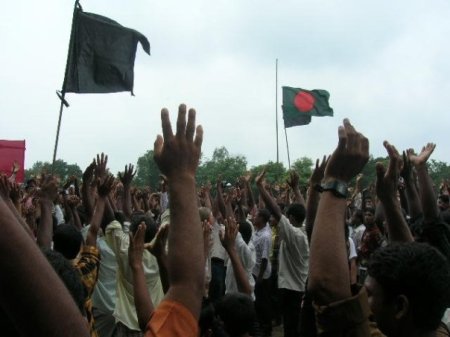Power crisis ‘artificially created’, ‘evil circle’ in power ministry
NewAge, April 22, 2009
The National Committee to Protect Oil, Gas, Mineral Resources, Power and Port on Tuesday requested Prime Minister Sheikh Hasina to fulfil the commitment she had made as the leader of the opposition in 2006 to not allow open-pit mining in the country.
‘The former opposition leader and the incumbent prime minister, Sheikh Hasina, visited Phulbari in Dinajpur on September 4, five days after the Phulbari tragedy, and made a strong announcement that she would resist any move to operate any open-pit mine there as well as any other place in the country,’ said the committee’s convenor, Sheikh Md Shahidullah, at a discussion meeting in the National Press Club.
He said that Sheikh Hasina had also extended her full support to the agreement that the committee signed on behalf of people of Phulbari with the then BNP-led four-party government for cancelling the contract with Asia Energy for mining the Phulbari coal-field and for banning open-pit mining.
The then government signed the six-point Phulbari agreement with the committee, who represented the people of Phulbari, after three persons were killed on August 26, 2006 when law enforcers opened fire on people demonstrating against the Asia Energy’s proposed open-pit mine at Phulbari.
Hasina held a public meeting in the premises of the Phulbari Government College on September 4 to protest against the killing. Influential AL leader Matia Chowdhury, who is now the agriculture minister, Mostafizur Rahman Fizar, who is now the state-minister for forest and environment, and Jatiya Samajtantrik Dal’s president, Hasanul Haque Inu, were present at that meeting.
Shahidullah, at a the discussion meeting on Power Crisis, Evil Circle in Energy Ministry and Aggression of the Multi-National Companies, alleged that a minister, who is a relative of Hasina, had reportedly said that the open-pit mining was the only way to overcome the current energy crisis.
He said that energy shortage could be mitigated by underground mining of various coal-fields. ‘If we go for underground mining, we can extract 10-20 per cent of our coal reserve and with this amount we can meet our demand for 20 years. If we do open-pit mining, there will be environmental disaster and the extracted coal will have to be exported because of the high cost of extraction,’ he claimed.
The member-secretary of the committee, Professor Anu Mohammad, said that the current power and energy crisis has been ‘artificially created’ so that the country’s gas- and coal-fields can be handed over to foreign companies on the plea of exploration and production. ‘It is like blackmailing the nation to force the launching of projects beneficial to the foreign companies,’ he said.
The former director-general of the Power Cell, BD Rahmatullah, also claimed that the power crisis has been artificially created to push more controversial power projects like rental power plants.
He blamed the previous BNP-Jamaat government for failing to commission new power plants and observed that the present government had also failed to take any initiative to do so.
He also blamed the bureaucracy for the current crisis and observed that the secretariat should be ‘bombarded’ to root out ‘hooligans’.
Shahidullah said that certain quarters were blaming the national committee for the delay in formulating the coal policy and awarding of offshore gas blocks. ‘It is the government, which is delaying, not we. The coal policy is being delayed so that it can be formulated in a way that will favour the multinational companies,’ he observed.
‘We demand that the coal policy should be formulated immediately, keeping the peoples’ interest in mind. The government should also scrap the bidding process for offshore blocks that took place during the tenure of the interim government and go for fresh bidding after framing a new model production sharing contract by taking the people’s opinion,’ he said.
He claimed that the PM’s adviser, Tawfiq-e-Elahi Chowdhury, was the leader of the ‘evil circle’ in the power and energy ministry, and the new chairman of Petrobangla, Muktadir Ali, was a ‘member’ along with others, and demanded their removal.
Justice Golam Rabbani, Professor Shamsul Alam, journalist Syed Abul Maksud and leftist leader Ruhin Hossain Prince were present on the occasion, along with others.




 Posted by zk
Posted by zk